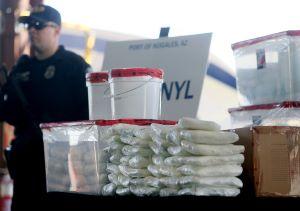Louisiana's hard right governor vetoes a bill that would have eased the pardon process for first-time marijuana possession offenders, the House Committee on the CCP forms a fentanyl working group, and more.

Marijuana Policy
Former DEA Heads, Republican Attorneys General Seek Public Hearing on Marijuana Rescheduling Proposal. The forces of recalcitrance are mobilizing to try to thwart marijuana rescheduling, with a group of former DEA administrators and a group of Republican state attorneys general both asking the agency to hold a public hearing on the plan to move marijuana from Schedule I to Schedule III of the Controlled Substances Act.
"Given the magnitude of the impact of the proposed rule and considering we face an unprecedented drug overdose crisis in this country," said the group of six former DEA administrators and three former acting administrators, "we write to emphasize that a hearing on this rulemaking is in the public interest." The former DEA heads added that the move is "likely the most consequential rulemaking DEA has ever attempted."
The 18 Republican attorneys general sounded a similar note.
"A public hearing is in the public interest, and therefore in the interest of our states," added the attorneys general, led by South Carolina AG Alan Wilson (R). Others who signed on represent Alabama, Arkansas, Idaho, Indiana, Iowa, Kansas, Louisiana, Mississippi, Montana, Nebraska, New Hampshire, North Dakota, Oklahoma, South Dakota, Texas and Wyoming. All are Republicans.
The two groups' requests came just before a Thursday deadline for filing comments requesting that DEA hold a hearing on the proposal.
Louisiana Governor Vetoes Bill Facilitating Expedited Pardons for First-Time Marijuana Offenders. Hard right Gov. Jeff Landry (R) has vetoed a bill that would have given the executive branch the ability to grant expedited pardons to first-time marijuana possession offenders, House Bill 391, suggesting it was a soft-on-crime measure.
In his veto message, Landry said one reason he killed the bill was because he saw it as "an attempt to have Louisiana accept President Biden’s invitation to the states to join his soft-on-crime, no-consequences-for-criminals agenda."
The bill would have allowed the governor to pardon eligible offenders without first receiving a recommendation from the state Board of Pardons. The measure easily passed both Republican-dominated chambers.
The move drew scorn from the National Organization for the Reform of Marijuana Laws (NORML), with Deputy Director Paul Armentano noting that other states around the country are taking steps to right the past wrongs of pot prohibition and saying that "it's a shame to see Louisiana’s governor taking the state in a different direction."
Foreign Policy
Chinese, US Officials Hold Talks on Countering Fentanyl Trade. The US and China held high-level talks on Thursday on counternarcotics cooperation. The meeting came just days after the two countries announced a breakthrough in bilateral cooperation in which both countries worked together to bust a money laundering operation where Chinese criminal elements washed drug money for the Sinaloa Cartel.
Rahul Gupta, director of the White House Office of National Drug Control Policy (ONDCP -- the drug czar's office) met in Beijing with China's minister of public security, Wang Xiaohong.
With fentanyl linked to hundreds of thousands of US overdose deaths, the US has been pushing China for more law enforcement cooperation, including taking on money laundering and controls over precursor chemicals. Chinese chemical companies often play a game of whack-a-mole, moving from fentanyl to different analogs as the Chinese government moves to regulate existing ones.
The day after the meeting, the Supreme People's Procuratorate, the county's top prosecutors' office, called on law enforcement across the country to focus on fighting drug trafficking. The office said it was ready to show its "determination and attitude to intensify efforts to crack down on related crimes."
House Select Committee on the Chinese Communist Party Announces Formation of Fentanyl Working Group. US House of Representatives leadership announced Thursday the formation of a Fentanyl Policy Working Group, as part of the Select Committee on the Strategic Competition Between the United States and the Chinese Communist Party.
Members, or at least the ones writing the PR, define the mission of the working group is combatting the Chinese Communist Party's role in the fentanyl epidemic -- a role the Chinese Communist Party denies. It builds on an April report from the Select Committee which charged, among other things, that the Chinese Communist Party is subsidizing the export of fentanyl into the United States.
The Fentanyl Policy Working Group will be led by Rep. Dan Newhouse (R-WA) and Rep. Jake Auchincloss (D-MA). Other members include Reps. Neal Dunn (R-FL), Ro Khanna (D-CA), Dusty Johnson (R-SD), Ritchie Torres (D-NY), and Michelle Steel (R-CA).
Specifically, the Fentanyl Policy Working Group sets out to:
- Codify, strengthen, and impose sanctions on entities involved in the fentanyl trade.
- Enact and employ trade and customs enforcement measures to restrict fentanyl trafficking.
- Close regulatory and enforcement gaps exploited by PRC money launderers and fentanyl traders.
This work by StoptheDrugWar.org is licensed under Creative Commons Attribution-ShareAlike 4.0 International
Add new comment